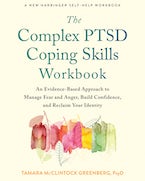By Tamara McClintock Greenberg, PsyD
A common problem we all face is that we may think clients are ready to talk about trauma, or even do exposure therapy, only to have them become destabilized in ways that make functioning difficult.
Common examples of symptoms of those who may be too overstimulated by trauma material are:
- Increases in difficulty modulating emotions
- Development or intensification of suicidal thoughts and/or self-destructive behaviors
- Disorganized thinking
- Increases in dissociation
- Dramatic escalation in nightmares and/or flashbacks
Fortunately, there are several ways we can pivot approaches to help comfort clients in these situations. First, consider holding off on thinking in detail about trauma until the client can feel more in control of their thoughts and behaviors.
I often articulate it like this to clients:
“We’ve gotten into some intense things here, and while we may ultimately consider that thinking about some of your trauma memories could be helpful, let’s step back a bit and see how we can make you feel better. What you’re experiencing is common and does not mean you’ve done anything wrong.”
Return to stabilizing techniques. My favorite of these are grounding strategies: tactile stimulation (e.g., ice packs), olfactory sensations (such as lavender oil), and external focusing on and describing of something in detail are a few ideas.
Mindfulness meditation can be useful. For people with trauma histories, I recommended guided meditation, so clients don’t feel so alone in their minds.
It’s always beneficial to go back to behavioral techniques such as exercise, distraction, and developing a daily, structured schedule/routine. In addition, finding meaningful social support is vital.
Finally, sleep is such an important but often overlooked component of mental health, especially for clients in crisis. Returning to reminders of good sleep hygiene and routines can be a crucial intervention.
Tamara McClintock Greenberg, PsyD, is a clinical psychologist and renowned expert in the treatment of depression, anxiety, trauma, and more. Her work has been published in HuffPost, Psych Central, Psychology Today, the San Francisco Chronicle, and she has been featured in Forbes, USA Today, Newsweek, Next Avenue (PBS), and The Washington Post. She has also been interviewed by major radio stations, including KQED’s Forum.



 2024 Peace Playbook: 3 Tactics to Avoid Clashes with Your Partner
2024 Peace Playbook: 3 Tactics to Avoid Clashes with Your Partner